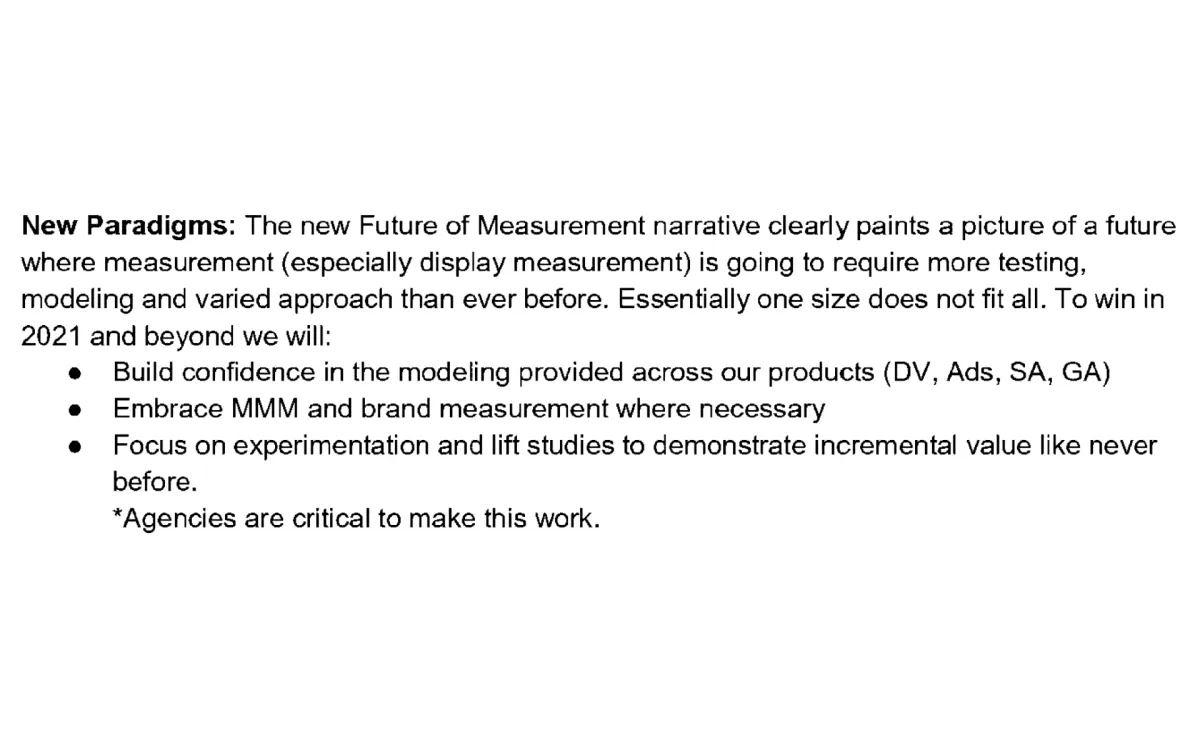
In a revealing court document from the ongoing antitrust case United States v. Google LLC, filed on August 24, 2024, in the U.S. District Court for the Eastern District of Virginia, Google's internal strategy for navigating significant changes in the digital advertising landscape in Canada has come to light. The document, labeled as Exhibit PTX1830, provides an unprecedented look into how the tech giant planned to address challenges in its programmatic advertising business for 2021 and beyond.
The confidential briefing, titled 2021 Programmatic Business Risk Analysis, was prepared for Google's Canadian executives. It outlines the company's concerns and strategies related to the impending deprecation of third-party cookies in Chrome, which was expected to occur in 2022 at the time of the document's creation. This change, along with other industry and regulatory policy shifts, posed significant risks to Google's targeting and measurement capabilities on third-party inventory.
According to the document, Google's Display & Video 360 (DV360) platform played a crucial role in the company's Canadian advertising business. In 2020, DV360 drove more than $392 million in revenue for Large Customer Sales (LCS) customers in Canada. The platform was responsible for of YouTube revenue and of Display & Video Advertising (DVA) revenue in the country. These figures underscore the importance of DV360 to Google's Canadian operations, with the document noting that Canada's DV360 business was one of the largest and most mature by Online Video Advertising (OVA) share of any major Google market.
The analysis revealed that approximately 37% of Canadian DV360 spend was audience-targeted from November 2019 to November 2020. This percentage was lower than the United States, where 50.2% of DV360 spend was audience-targeted during the same period. The document suggests that of Canada's DV360 spend was not directly impacted by cookie erosion, but the remaining would face challenges due to the diminishing value proposition of demand-side platform (DSP) technology without the ability to frequency cap across inventory sources and report on view-through conversions.
Google's executives expressed concern about the uncertainty among their most strategic customers and the potential for competitors to exploit this instability. The document mentions that walled gardens like Facebook could make a play to absorb privacy-challenged display revenue, while programmatic competitors such as The Trade Desk (TTD) and LiveRamp might challenge stable DV360 relationships with aggressive points of view on the future of identity in digital advertising.
To mitigate these risks, Google outlined several strategies for the Canadian market. In the near term (first half of 2021), the company planned to communicate more concrete details on the testing plans for potential solutions, including Privacy Sandbox, Personally Identifiable Information (PII) ID integrations, and additional modeling/machine learning use cases. The document emphasizes the importance of service as an area of investment to stay ahead of competitors, particularly with agency buying teams.
For the mid-term (second half of 2021 to 2022), Google planned to begin onboarding Canadian marketers and agencies to beta testing of its Privacy Sandbox. The company also set objectives to future-proof measurement strategies with technical solutions such as One Google Tag (OGT) and Google Analytics 4 (GA4). Additionally, Google's Advanced Marketing Analytics (AMA) data science strategy was set to pivot towards providing new methods of delivering equivalent or better insights without relying on one-to-one digital identity.
The document details Google's targeting risk mitigation strategy, which includes the development of Privacy Preserving APIs (Privacy Sandbox). These APIs, particularly Federated Learning of Cohorts (FLoC) and TurtleDove, were positioned as part of Google's vision for a privacy-centric future of digital marketing on the open web. FLoC was described as an evolution of interest-based targeting, while TurtleDove represented an evolution of remarketing.
Google also introduced the concept of a Composite Audience Metric (CAM), developed by the US Platforms Solutions Product Strategy and Privacy Team. This metric aimed to measure the durability of audience targeting tactics and guide the migration of vulnerable audience spend to more durable alternatives, such as Customer Match, Google Audiences, and Similar Audiences.
The document highlights Google's focus on first-party data strategies, including the use of Accelerate 1PD Labs to help marketers grow and effectively activate their first-party data sets. The company also planned to evolve its AMA projects to focus on durable activation and measurement.
Regarding measurement risk mitigation, Google noted that revenue at risk due to loss of measurement was substantially mitigated by already-launched modeling solutions in core performance reporting across Google Marketing Platform (GMP). The company emphasized the importance of adopting new tagging solutions like One Google Tag (OGT) and server-side Google Tag Manager (sGTM) to preserve basic click-through conversion measurement without relying on third-party cookies.
The document also touches on Google's plans to build confidence in modeling provided across its products (DV360, Google Ads, SA, GA), embrace Media Mix Modeling (MMM) and brand measurement where necessary, and focus on experimentation and lift studies to demonstrate incremental value.
Key facts from the court document
The confidential briefing was prepared for Google Canada executives in 2021.
DV360 drove over $392 million in revenue for LCS customers in Canada in 2020
37% of Canadian DV360 spend was audience-targeted from November 2019 to November 2020.
Google planned to onboard Canadian marketers and agencies to Privacy Sandbox beta testing in the second half of 2021.
The company introduced the Composite Audience Metric (CAM) to measure the durability of audience targeting tactics.
Google emphasized the adoption of new tagging solutions like One Google Tag (OGT) and server-side Google Tag Manager (sGTM).
The document outlines strategies to mitigate risks associated with the deprecation of third-party cookies in Chrome.

